













By KEILE CAMPBELL Tribune Staff Reporter
kcampbell@tribunemedia.net
AFTER decades of wading through floodwater and replacing ruined furniture, Pinewood Gardens residents voiced frustration and hope as officials unveiled a $20 million drainage plan aimed at finally ending the community’s long-standing flooding crisis, which was worsened recently by Tropical Storm Imelda, which inundated large parts of the neighbourhood. Many at the Ministry of Works town-hall meeting said they were exhausted by years of promises that never materialised. One
By JADE RUSSELL Tribune Staff Reporter
jrussell@tribunemedia.net
A FOUR-YEAR-OLD girl who witnessed her father’s murder still plays with dolls as if speaking to him, a haunting reflection of the trauma she carries months after the brutal shooting.

Over $12m in drugs seized by law enforcement operations on weekend
“If you watch her sometimes, she ask the doll how you feeling? You feeling
Samantha Clarke, grandmother of the child and mother of 24-year-old murder victim Quintero Arnett, said her granddaughter often uses two dolls—one for herself and one for her father—to act out their conversations.



LAW ENFORCEMENT agencies seized nearly $12.3m worth of suspected cocaine in two major drug operations over the weekend, one on Cat Island and another on Grand Bahama.
In the larger bust, officers recovered 359 kilograms of
suspected cocaine valued at $7.81m during a joint operation in southern Cat Island on Saturday. According to police, the operation involved officers from the Drug Enforcement Unit (DEU), OPBAT, and US counterparts. Acting
on intelligence, the team travelled by helicopter from New Providence and, with assistance from local officers, searched an area near McQueens where two men were allegedly found hiding
By JADE RUSSELL AND KEILE CAMPBELL Tribune Staff Reporters
THE death of Vaughn Miller has created a vacant seat and exposed deep fractures in voter confidence, with long-time Progressive Liberal Party (PLP) supporters disillusioned, some pledging to defect, and others questioning whether
By LEANDRA ROLLE Tribune Chief Reporter
politics itself can deliver meaningful change.
Residents who spoke to The Tribune on Saturday described a constituency starved of attention, where potholes deepen, costs soar, and many say their representative’s presence in the community had waned long before his sudden passing
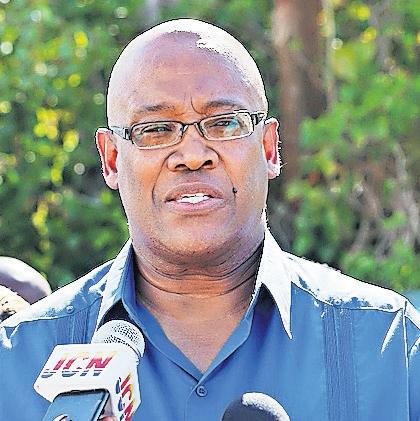





sad,” Ms Clarke said.
The child saw her father gunned down in February on Dunmore Street in a shooting captured on CCTV. The footage, which showed gunmen continuing to fire as the little girl fled, sparked national outrage.
Ms Clarke said the child sometimes grows quiet and emotional when thinking about her father. Though she fondly says he is in heaven, she struggles to grasp that he will never return.
The grandmother said her granddaughter often groans in her sleep, a disturbing habit that began after the killing. “As long as you laying on the side of her, you probably tap her back and just pray for her to go back sleep. You know, whatever she thinking about or dreaming about, give her peace of mind,” she said.
Days after the shooting, Ms Clarke said the child drew a picture of her
father lying on the ground surrounded by people and another of him ascending to heaven.
She described her granddaughter as generally happy but said she remains vigilant about her emotional well-being and plans to ensure she continues counselling.
The family insists Quintero was not the intended target, claiming he had no criminal record or history of trouble with the law.
Ms Clarke has repeatedly urged police to solve the case, accusing the Royal Bahamas Police Force of showing bias in which murders they prioritise. She said she last heard from investigators about three weeks before her son’s funeral.
Since his death, Ms Clarke said she has struggled with sleepless nights and grief, vowing never to let her son’s case go cold.
On the morning of the incident, Quintero sat in a vehicle with his daughter and girlfriend outside a business when a car pulled up. Masked gunmen


COCAINE from page one
in bushes close to the stash.
The suspects, aged 42 and 37, were arrested and transported to New Providence for questioning. The drugs were also flown to the capital for further investigation.
A day later, on Sunday, officers conducting a separate joint operation on Grand Bahama discovered another major shipment of suspected cocaine concealed in a shipping container at a port facility.
Police said the search
— carried out by the DEU, the Bahamas Customs Department, and US counterparts — uncovered 181 kilograms of suspected cocaine with an estimated street value of $4.5m. No arrests were made in connection with that seizure.
In a statement, the Royal Bahamas Police Force commended the collaboration between Bahamian and US authorities, saying their coordination continues to play a critical role in the fight against drug trafficking throughout the islands.

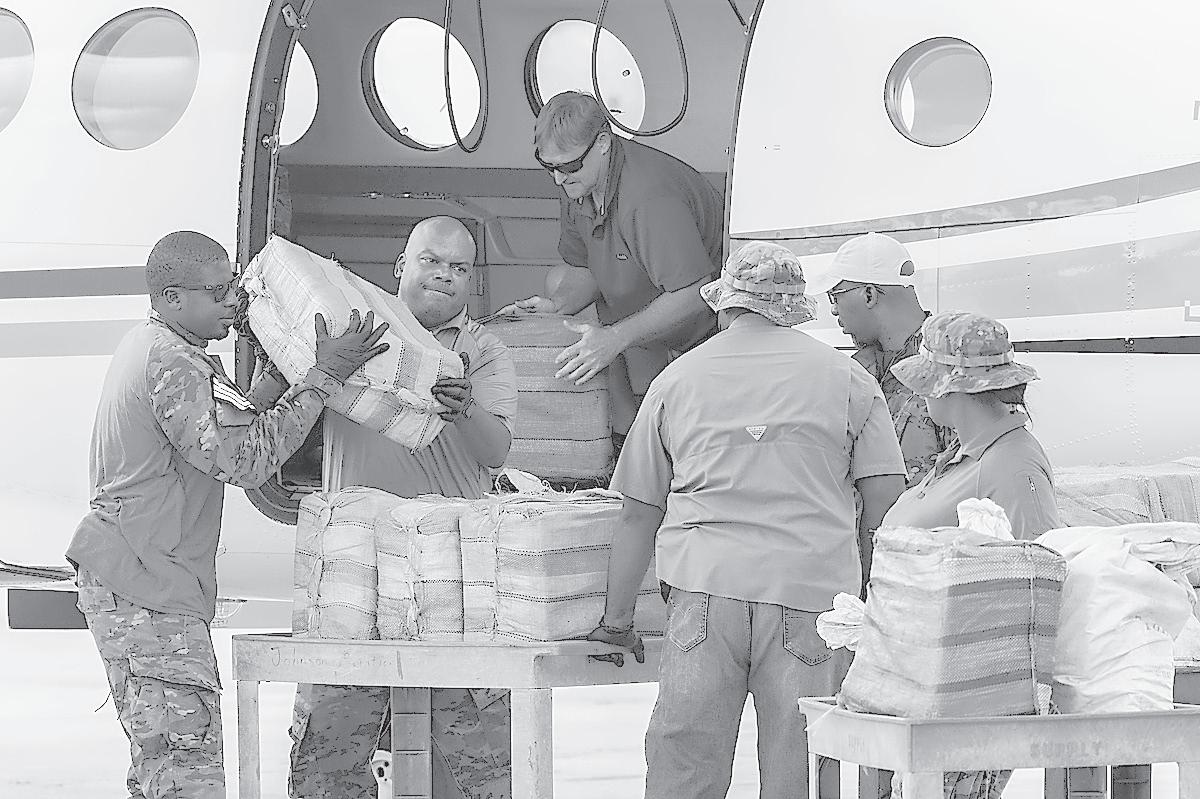


POLICE have confirmed that a 24-year-old man who was shot in Montell Heights last week has died from his injuries. The victim was wounded during a daylight shooting on Bowe Avenue shortly after 1pm on Thursday, October 2, and died in hospital on Saturday. Preliminary reports indicate the man was at a local business establishment when a black Japanese vehicle arrived at the scene. Three masked men reportedly exited the vehicle, brandished firearms, and opened fire in his direction.
The victim managed to evade the assailants but was struck in the legs. He was later taken to hospital by private vehicle. Police have not identified the victim or revealed a motive for the attack.
POLICE are investigating an apparent suicide attempt involving a 24-yearold man at a home on Zion Boulevard early Saturday morning. According to initial reports, shortly after 5am the man allegedly ingested a liquid chemical and then
inflicted injuries on himself with a sharp object. He was taken to hospital for medical treatment and evaluation.

resident said people had been waiting more than 40 years while repeatedly suffering flood damage, furniture loss, and high recovery costs. Another woman recalled that during a previous downpour, a Defence Force officer had to rescue her from her apartment after floodwater rose to her chest. She said she lost most of her belongings and was still trying to recover financially.
A Jacaranda Street resident described being trapped in her home for days during the storm, while another from Pigeon Plum Street said she had to wade through waist-deep water to reach food and help.
Ms Fields of Plane Street said repeated flooding had destroyed her appliances and left her without a working refrigerator.
Some demanded compensation, arguing that developers, the government, and banks should be held accountable for years of neglect.
Others called for unity and urged residents to support the initiative. Longtime resident Samuel Bethel said the plan offered “a real opportunity to bring lasting change” if the community

Drive, one of several neighbourhoods that experienced significant flooding in the aftermath of Tropical Storm Imelda on September 30, 2025.
stood behind it, while Darlene Johnson of Jacaranda Street thanked officials for engaging residents directly and said she hoped the project would finally reach completion. Despite moments of tension, several attendees praised the Ministry’s outreach and urged residents to look beyond politics.
Chief Engineer Francis Clarke said the $20 million project, part of a wider InterAmerican Development Bank partnership, seeks to strengthen climate resilience, improve mobility, and modernise infrastructure across New Providence, with Pinewood identified as a top priority.
Photo: Dante Carrer/Tribune Staff
“The rainwater intensity that we had 30 or 40 years ago is not the same that we have today,” he said, noting that existing drainage systems “do not meet 21st century standards.”
He explained that Pinewood’s geography, nestled between two ridges, creates a bowl effect that traps rainfall. The plan includes new open drainage channels with grates along main roads, settling ponds, and three canals that will funnel water safely to the sea.
Environmental safeguards are built in, he said, including filtration systems and oil separators to stop pollutants from entering marine areas. He acknowledged residents’
concerns about upkeep, saying past neglect would not be repeated. “Right now, we have a reactive culture,” he said. “We will be implementing an asset management system where we will be doing regular, routine maintenance so we won’t have to be so reactive.”
Mr Clarke said the project’s design phase is nearly complete and will go to tender in November, with construction expected to start early in 2026 and take up to 18 months. During the works, residents should expect dust, diversions, and temporary disruption to roadside vendors, managed under an Environmental and Social Management Plan.
He said the devastation from Tropical Storm Imelda, which dumped more than eight inches of rain on New Providence, underscored how outdated drainage systems can no longer cope with modern rainfall.
“There are areas in New Providence that never used to flood, and we’ve seen unprecedented flooding,” he said, citing Chippingham and St Albans Drive among the hardest hit.
Mr Clarke credited daily drain clearing this summer for sparing parts of Pinewood and downtown from worse damage, calling
consistent maintenance “key to mitigating flooding.”
Pinewood MP Myles LaRoda said the turnout reflected how deeply residents care about finding a solution. He said the issue of compensation raised by homeowners was a complex one.
“The issue of reparation and compensation is one that you don’t want to dismiss, but there are some legal implications also,” he said. “I sympathise with those homeowners who are losing furniture, but again, if it starts in Pinewood, where does it end?”
Mr LaRoda noted that successive governments have often provided help on moral rather than legal grounds. “Governments have taken positions of providing assistance to the public in a lot of cases where they’re not legally mandated to do so,” he said. He added that the project would inevitably disrupt traffic once work begins, since the planned canals and drains will cut across several streets. “If we’re going to be digging canals, those canals will run, and you’re talking about, where Pinewood is now, just on geography alone, going into the canals you’re going to be going across streets,” he said.
Mr LaRoda said teams
had already started repairs in parts of the community, filling “craters and holes” and clearing drains along Cordia Street. He said the broader $20 million investment would include road paving and speed bumps to reduce wave action from speeding vehicles. Describing the project as long overdue, he said: “The encouraging thing about this is, and the question was asked, why now? When I campaigned here, I campaigned the PLP’s position was we were going to bring a resolution to this vexing problem. The Bahamas is different now than it was 40 years ago. Those remediations suggested 40 years ago did not take into account climate change, the heat, the moisture, and the water that is there.”
He said the Pinewood work will serve as a pilot for flood-prone communities nationwide. “At the end of the day, my hope and prayer, and the position of the government along with the Ministry of Works and in partnership with the IDB, is that at the end of this process, that pain and that frustration would all be worth it,” he said. “A year and a half or whatever the timeline is, and we end up with a product that we can be proud of.”
By LYNAIRE MUNNINGS
Tribune Staff Reporter lmunnings@tribunemedia.net
THE government is providing temporary housing for multiple residents displaced by flooding and roof damage during Tropical Storm Imelda, according to Social Services Minister Myles Laroda.
He said help varies depending on the extent of damage, ranging from minor flooding to severe structural failures, including roof collapses in some older Pinewood homes.
“We have some cases of roofs collapsing,” Mr Laroda said yesterday. “We’ve had some people where the flooding has been so bad that they had to move out, and so we have Social Services intervening to assist with temporary shelter.”
damage sustained. He did not say how many people are being helped or where they are staying.
He said multiple families are receiving help in Pinewood and other communities, with shelter provided until repairs allow them to return home. The length of assistance, he added, depends on the

“You had some people who had probably half an inch of water in their homes, which they have removed,” he said. “You had others who literally have to have pumps and pump the water out. If your roof collapsed but you could get it ready in two weeks or a month, the government is committed to
extend those persons until they are in a position to go back within reason.”
Mr Laroda also clarified that small home repairs fall under Urban Renewal, not the Department of Social Services, a distinction that has caused confusion since a Cabinet reshuffle transferred Urban Renewal to the Ministry of Housing. He said Social Services steps in only in extreme cases, working with Urban
Renewal and the Disaster Risk Management Authority to provide materials where necessary. Tropical Storm Imelda swept across The Bahamas last weekend, bringing heavy rain, flooding, and power outages but no loss of life. More than 200 people sought shelter in Abaco and Grand Bahama, where evacuations were widely followed and airports briefly closed.
Laroda sounds alarm on growing crisis of elder abuse in the country
By LYNAIRE MUNNINGS Tribune Staff Reporter lmunnings@tribunemedia.net
SOCIAL Services Minister Myles Laroda has sounded the alarm on the growing crisis of elder abuse and neglect in The Bahamas, calling for immediate national action to protect the country’s senior citizens from mistreatment, abandonment, and housing insecurity.
Between 2023 and 2025, the Department of Social Services’ Senior Citizens Division received 123 requests for government rental units, 163 requests for group home placement, and 74 requests for geriatric hospital placement. In the same period, there were 33 reports of neglect, two reports of financial abuse, nine reports of physical abuse, six reports of verbal abuse, one report of sexual abuse, and one case of self-neglect.
“Behind every one of these numbers is a life, a mother, a father, a grandparent, a neighbour, someone who deserved to live with dignity and respect,” Mr Laroda said at a press conference marking the start of Older Persons Month, observed every October. “What is most alarming is that so many of these requests and reports come from older persons who had nowhere to live, or who are living in substandard conditions.”
“In some cases, families genuinely could not provide the level of care their loved ones need. But in other cases, families simply step aside, no doubt with the belief that it was the government’s responsibility to take over.”
The Minister warned that the reported cases likely represent only a portion of the problem.
“They shine a light on what has been reported, and that in itself, is enough to stir us to action, to advocate for the care and protection of

older persons,” he said. “We must go beyond words. It means creating safe spaces, ensuring access to decent housing, fighting against abuse in every form, and building a culture where no senior feels abandoned or discarded.”
Mr Laroda urged the public to remain vigilant for signs of elder abuse, including visible injuries, poor hygiene, lack of adequate food or clothing, sudden weight loss, untreated medical issues, withdrawn behaviour, or suspicious financial activity. He stressed the importance of regular contact with older relatives and neighbours, encouraging open communication and reporting any suspected abuse to the police or Social Services, including via the 24-hour hotline at 422-2763 or 711.
According to officials, seniors are defined as people aged 60 and older. Once abuse is reported, the Department of Social Services works with the Royal Bahamas Police Force to investigate.
Reflecting on his own upbringing, Mr Laroda recalled being raised by grandparents and a greatgrandmother born between 1884 and 1910, describing the values of community, sharing, and mutual respect that shaped earlier generations. He said those values must be preserved and practised by younger Bahamians today.
“I am sure each of us can think of a grandmother, grandfather, or even a senior in our family who has shaped us in one way or another,” he said.
“These are the people we must cherish, and it’s not just because of the special role they once played in our lives, but because of who they are and what they should still mean to us today.”
Mr Laroda quoted United Nations Secretary-General Antonio Guterres, who said: “We must respond with foresight and action. That means ensuring that the rights of older persons are fully respected, their dignity upheld, and their contributions recognised. All communities and ages benefit from the wisdom of older persons. They have much to teach about navigating uncertainty, resolving conflict and building solidarity across generations.”
The department provides various support services for older people, including financial assistance, food aid, fire relief, and burial assistance, across both New Providence and the Family Islands. A series of public education and awareness events for seniors is scheduled throughout October.
VOTERS from page one
on September 28.
Catherine Lowe, 72, a Golden Isles resident since 1992, lives just steps from the PLP’s constituency office yet could not recall the last time she saw Mr Miller and questioned what he accomplished as an MP for nearly eight years. “I don’t know personally who he do it for, but he ain’t do nothing for this community.”
Her frustration reflects a broader disenchantment among voters who say they feel abandoned by successive administrations. Ms Lowe, who backed Mr Miller when he ran under the Free National Movement (FNM), said she regretted that support. “They always say, but everybody’s doing the same thing,” she said. “Everybody want tief. I say well, let some new tief go there.” She said she would support the Coalition of Independents this time.
Mr Miller’s political journey embodied the partisan churn now exhausting many voters. Elected in 2017 as an FNM candidate, he was fired as a parliamentary secretary after voting
against the Minnis administration’s VAT hike. He later resigned from the party after being a consistent, vocal critic. By 2020, he joined the PLP, citing his principles and frustration with the FNM’s decisions, such as leasing the Town Centre Mall, partly owned by the Symonette Family, to house the Post Office.
But some say his switch never translated into renewed engagement. Ms Lowe claimed the PLP under his tenure failed to create opportunities for young people, echoing another resident’s lament that graduates returning from abroad still struggle to find jobs.
Entrepreneur Shenique Burrows, 46, said many residents forgot Mr Miller was even their MP. “I come from hardcore PLPs,” she said, adding she is unsure whether she will vote for the PLP in a by-election or the next general election. She joked that local churches seemed to do more for the community than the governing party. Others share her ambivalence but differ in degree. One woman, a resident since 2007, said she is unsure if she will vote at all, describing politics as a cycle
By LEANDRA ROLLE Tribune Chief Reporter
lrolle@tribunemedia.net
FORMER Attorney Gen-
eral Sean McWeeney says any government planning a constitutional referendum should act early and start small, focusing on “low-hanging fruit” like entrenching national symbols, declaring English the official language, and constitutionalising the right to vote, warning that waiting too long invites public distrust and defeat.
Speaking at a four-day University of The Bahamas conference on the future of democracy, Mr McWeeney, who chaired the Constitutional Commission in 2013, said the later a referendum is held in a government’s term, the greater its chances of defeat.
“Don’t wait too late to bring it on,” he said. “It behooves the next government to stage a referendum early on, within say, the first 12 to 18 months following the general election when it’s popularity and by extension, the marketability of its constitutional reform proposals are likely to be in pretty good shape.”
He said past constitutional referendums on gender equality failed because of voter distrust and frustration with government agendas.
Mr McWeeney said reform should begin with smaller, less divisive measures. “Instead of starting with big, blockbuster heresies, such as men and women should be treated equally, we should start instead with smaller, less shocking reforms,” he added.
He identified several “low-hanging fruit” reforms, many from the last Constitutional Commission report: requiring that the GovernorGeneral, Chief Justice, and Court of Appeal President be Bahamian citizens; constitutionalising the Office of the Ombudsman; and ensuring the executive’s power to enter treaties requires preapproval rather than only post-ratification.
He also urged that the Parliamentary Commissioner, Boundaries Commission, and wider electoral system be removed from ministerial control and placed under an independent, constitutionally protected body.
“The key thing is to get people accustomed to changing the constitution,” Mr McWeeney said. “Right
of promises and neglect. Her husband, she added, is considering a third party. “Every political party starts off with good intentions,” she said, “but somehow forget the people who voted them in along the way.”
That sentiment — a weary detachment from both major parties — surfaced repeatedly during interviews across Golden Isles, including Coral Heights and nearby communities. Several residents complained of overgrown parks, worsening traffic, and concerns about illegal immigration. One woman said she has noticed frequent government travels while the cost of living is unbearable.
Another resident, Kevin Pratt, 57, said he now supports the COI. “Put some fresh breeze in this town. We need a change, serious change, in order to save this country,” he said.
Maria Dove, who divides her time between Golden Isles and another constituency, said MPs must be “more visible and accountable,” adding that residents worry about immigration’s effect on job competition and population growth.
Still, not everyone shared the criticism. Darroch George, 52, who moved to
Golden Isles three years ago, said Mr Miller was “excellent” and “steadfast in his duties.” “That’ll be some big shoes to fill,” he said. “People looking for someone with empathy, understand? So him being a man of faith, he had the heart of the people.”
A Coral Heights man, 67, described Mr Miller’s performance as “okay,” saying he did not have high expectations but would vote PLP again. He rejected claims that young people lacked opportunity, arguing instead that most people don’t have the skills for the jobs.
The PLP is expected to hold a by-election to fill the vacancy, though some in the party believe Prime Minister Philip “Brave” Davis should call an early general election instead.
According to party insiders, Senator Darron Pickstock is the leading name being considered for the nomination. They said if the by-election goes ahead, the PLP intends to frame the contest as a national battle between Prime Minister Philip “Brave” Davis and FNM Leader Michael Pintard, rather than a hyper-local race focused on the two candidates.
Golden Isles is considered

a swing seat, having alternated between the two major parties in recent elections.
FNMs note that their likely candidate, Brian Brown, is a former longtime general in the constituency who has been active on the ground for years and is now “on the frontlines” ahead of a possible vote. Mr Brown won just 37 percent of the vote in 2021 compared to Mr Miller, who won 50 percent.
now, there is a very deeply ingrained resistance to that and then once we get people accustomed to these smaller changes, we can move to the big ticket items like expanding the fundamental rights and freedoms under the Constitution.”
The Bahamas has held two constitutional referendums since independence, both unsuccessful. The first, in 2002, sought gender equality and other reforms. The second, in 2016, again proposed amendments to achieve gender equality. Both were rejected by voters.
cautioned Bain-King and her husband Antonio King, who appeared before him on separate charges.
King is accused of assaulting his wife on August 24, while she is accused of causing $700 worth of damage to another woman’s blue Chevrolet Malibu on September 25.
Both defendants have denied the offences – with
King accusing his wife of having a vendetta against him.
“All of this is about her trying to take over my property,” he told the court. “I need her out of my place.”
However, Bain-King countered that she is named in the will left by his late father.
She told the court her husband had also tried to evict both her and their daughter from the home.
“We are legally married.
Opposition Leader Michael Pintard has urged Mr Davis to call a general election instead of a byelection, arguing that, given the country’s economic challenges, it would be wasteful to spend millions on a single constituency vote when broader national issues remain unresolved.
Under the Parliamentary Elections Act, a writ for a by-election must be issued within 21 to 30 days of a vacancy. Political observers believe the result in Golden Isles could serve as a gauge of the Davis administration’s support as it nears the end of its term.
A by-election would follow the PLP’s commanding performance in the West Grand Bahama and Bimini by-election in 2023, held after the death of Obie Wilchcombe. The governing party increased its margin of victory there compared to the 2021 general election.
He can’t put me out of the marital home,” she said. She then detailed her relationship with her husband, telling the judge he often fought with her in front of her children and constantly harassed her. She claimed she has two protection orders against him, but he refuses to stay away.
King responded by calling her a “liar,” sparking a heated back-and-forth.
“This is ridiculous,” he repeatedly said.
The judge cautioned both defendants, noting that their marital issues were not for his court to decide.
He also advised the couple to seek redress through the proper legal channels.
The magistrate then granted bail to both defendants and ordered them to stay away from the virtual complainants. Both are scheduled to return to court in November.

NULLIUS ADDICTUS JURARE IN VERBA MAGISTRI
“Being Bound to Swear to The Dogmas of No Master”
Publisher/Editor 1903-1914
LEON E. H. DUPUCH
SIR ETIENNE DUPUCH, Kt., O.B.E., K.M., K.C.S.G., (Hon.) LL.D., D.Litt .
Publisher/Editor 1919-1972
Contributing Editor 1972-1991
RT HON EILEEN DUPUCH CARRON, C.M.G., M.S., B.A., LL.B.
Publisher/Editor 1972-
Published daily Monday to Friday
Shirley & Deveaux Streets, Nassau, Bahamas N3207
TELEPHONES
News & General Information
(242) 502-2350
Advertising Manager (242) 502-2394
Circulation Department (242) 502-2386
Nassau fax (242) 328-2398
Freeport, Grand Bahama (242)-352-6608
Freeport fax (242) 352-9348
WEBSITE, TWITTER & FACEBOOK
www.tribune242.com

@tribune242 tribune news network

HAMAS announced that it has accepted several parts of the peace plan put forth by US President Donald Trump and Israeli Prime Minister Benjamin Netanyahu to finally end Israel’s war on Gaza.
Hamas has agreed to release the remaining Israeli captives it holds and is willing to hand over administration of Gaza to a technocratic committee proposed by the plan.
However, Hamas did not say it would disarm. Nor did it agree to withdraw from Palestinian politics fully. Instead, it said the future of the Gaza Strip and legitimate rights of the Palestinian people should be decided on the basis of a “collective national position” and relevant international laws and resolutions.
With ceasefire talks resuming in Egypt on Monday, Netanyahu said he expected the hostages to be quickly released and Trump said he believes Hamas is “ready for a lasting peace”.
However, there are many reasons for Hamas to be reticent about supporting a plan that is replete with ambiguity and robs Palestinians of agency to decide their own political fate.
So, why does Hamas seem reticent?
First, the plan envisages Israel’s continuing military occupation of Gaza until it can hand over responsibility to an “international stabilisation force” at some point in the future.
Then there is the plan’s proposed governance structure.
Under the plan, Gaza would be administered through a transitional period by “a technocratic, apolitical Palestinian committee”. This would be responsible for delivering basic services to millions of starving, traumatised, homeless and jobless Gazans.
Yet, this committee would also include international experts, which will dilute Palestinians’ voices and their ability to decide the fate of Gazans. Again, many details remain unknown, including who will sit on the committee, when it will be formed and how many members would be Palestinian.
A new international transitional body called the “Board of Peace” would also be formed, headed by Trump and purportedly including former British Prime Minister Tony Blair. Importantly, the plan does not specifically say the board would include any Palestinians.
The board would be responsible for the committee’s “oversight and supervision”. It would also oversee the reconstruction of Gaza until the Palestinian Authority (PA), which is currently dominated by the Fatah party, has undergone reforms and is able to take back control of Gaza.
Many questions remain unanswered here, too. These include: a timeline for new elections for the Palestinian Authority whether Gazans can take part in an election which political factions would be permitted to run candidates whether these candidates would be screened by the board, and who decides whether the PA has reformed sufficiently.
This leaves an open-ended political process exposed to differing interpretations that Hamas may fear will take power out of the hands of Palestinians.
After Hamas’ statement was released, a senior Hamas official outright rejected the idea of the “Board of Peace”, saying: We will never accept anyone who is not Palestinian to control the Palestinians.
The plan also stipulates that Hamas “and other factions” (left unstated and open to interpretation) will not have a role in the future governance of Gaza. And it mandates that Gaza be demilitarised. But how this would be achieved and by whom, again, remains unknown.
These stipulations not only deprive the Palestinians of agency. They ignore the reality of Palestinian politics and the legitimacy that Palestinians attach to resisting Israeli occupation and the Netanyahu government’s stated goal of denying Palestinian statehood.
This highlights the greatest challenge for the “Board of Peace” – a reformed Palestinian Authority under the control of the Fatah party would struggle to gain legitimacy among Palestinians.
In a poll of 1,270 respondents in the Occupied Territories in May, Fatah garnered only 21% of popular support, compared with 32% for Hamas, and 12% for third parties.
When asked what the PA should be doing, most respondents nominated forming a unity government comprising all Palestinian factions to negotiate with Israel and the international community to rebuild Gaza.
When asked about plans to disarm Hamas, 77% of respondents in both the West Bank and Gaza opposed this action, with 65% of respondents opposed to expelling Hamas leaders from Gaza.
Tellingly, 80% of total respondents believed that if Hamas did disarm, Israel would not end the war and withdraw from Gaza.
The reality is some Palestinians still want Hamas to be a part of any future Palestinian government and remain capable of protecting Gazans from Israel’s military.
The disconnect between the plan’s aspirations and the political reality on the ground means it may have little chance of success, even if Hamas ultimately agrees to it.
It’s also unclear if Netanyahu truly supports the Palestinian Authority running a future Gaza, as the peace plan says. His remarks alongside Trump last week run counter to the plan:
Your plan is consistent with the five principles my government set for the end of the war and the day after Hamas. […] Gaza will have a peaceful civilian administration that is run neither by Hamas nor by the Palestinian Authority.
This suggests that Netanyahu’s primary goal here is dismantling Hamas’ military capabilities and political rule, while also maintaining the political division that currently exists between Gaza and the West Bank and East Jerusalem.
However, this would deny Palestinians the only faction many see as willing to resist Israel’s occupation and its intent of destroying any chance of Palestinians gaining statehood.
Additionally, the establishment of a new civil and military bureaucracy to help Gaza’s transition would take an indefinite period of time. It would also be subject to the political whims of capricious Western leaders.
This would leave the Israeli military occupying Gaza for the foreseeable future. This means there would be nothing to protect the millions of Gazans from further assaults from a military already accused of serious breaches of international humanitarian law.
By Martin Kear, University of Sydney



EDITOR, The Tribune.
A PROFOUND struggle is unfolding in the heart of The Bahamas, centered on its most vibrant expression of national spirit: Junkanoo.
What began over the years as a debate over authenticity, the introduction of new instruments, the shift in costume materials, and the evolution towards a Carnival-like spectacle has now crystallised into a more concrete and pressing cultural fight. At its core, this is a battle over narrative and authority. Who has the right to steer the soul of Junkanoo?
Is it the government, through newly formed committees seeking to structure and institutionalise the parade, or the Junkanoo community itself, through the continuous, organic process that has sustained it for generations?
This confrontation forces a painful and fundamental question. Can a nation remain itself when not only its cultural parts are changing, but the very mechanism of its cultural stewardship is being contested?
The essence of the conflict is twofold. Firstly, there is the powerful, human desire for preservation, a longing for a tangible connection to a past that defines the present. For many, the modern Junkanoo feels like a replica, its authentic rake-and-scrape rhythms silenced by foreign pop, its familiar spirit diluted. This perspective is a defense of a unique heritage against homogenisation. Yet, this sentiment is now compounded by a more immediate grievance, the feeling that the community is being dispossessed of its own creation.
The question of control is not abstract. It strikes at the heart of cultural ownership. When a government committee assumes authority over scheduling, funding, and judging, it challenges the
native, grassroots narrative that Junkanoo is “of the people, by the people, and for the people.” This shift from collective, organic management to top-down administration is perceived by many as the ultimate betrayal, a final step in disconnecting the festival from its living, breathing source. Yet, culture is not a static artifact, it is a living entity in a state of perpetual flux.
The Junkanoo celebrated today is itself the product of centuries of evolution, a fusion of African roots, colonial history, and local innovation. From this viewpoint, the new influences and even new structures are potentially the latest layer in an ongoing story.
The government may argue that formal organisation is necessary for the festival’s survival and growth in a modern context, ensuring safety, securing sponsorships, and maximising tourism. The culture, they might contend, has not been lost but is simply being managed for a new era. Thus, the fight for control becomes a clash between two visions of evolution. One is driven from the ground up by tradition and collective practice, and the other is directed from the top down by policy and institutional planning.
The true tragedy of the current moment, however, is the fractious spirit this power struggle has ignited. The debate over control has devolved into a battle where “winning at all costs” supersedes the shared goal of cultural vitality. The focus shifts from a collective asking, “Who are we becoming?” to a divisive conflict over “Who holds the power?”
This internal rift, pitting community against committee, native intuition
against bureaucratic design, is more damaging to the Bahamian spirit than any external influence. It threatens the unity that is the very bedrock of a national culture, making the festival a prize to be won rather than a heritage to be nurtured together. Therefore, the path forward requires a courageous national introspection that must address this core issue of governance. Bahamians must undertake a historical search to understand not just the evolution of their art forms, but the evolution of their cultural stewardship. The objective cannot be to “repair the beach” to a bygone state of pure community control or to unconditionally embrace a fully institutionalised future.
Instead, the nation must consciously decide: how can it build a model of stewardship that respects the organic, collective genius of the Junkanoo community while harnessing the necessary support and structure that a modern state can provide? The goal is to forge a compromise where the culture is not controlled by a single entity, but guided by a partnership that keeps its soul intact.
The Bahamas, like all living cultures, is indivisible from both its reality and its perceived memory. The festival, the music, and the people are not the same as they were in “the nether years.” The urgent task is not to prove that the national ship is the original one, but to ensure that its voyage continues with purpose, that its crew, both community and government is united, and that its direction is guided by a deep, collective understanding of where it has been and a conscious, collaborative choice about where it is destined to go. Hoping for the best in an unseen current.
B AZZAN JOHNSON Grand Bahama October 3, 2025.
By KEILE CAMPBELL Tribune Staff Reporter kcampbell@tribunemedia.net
FUEL shortages, crumbling infrastructure, and decades of neglect have left Crooked Island residents struggling to maintain even the most basic services, with health care, transportation, and tourism all under strain.
Residents told The Tribune gasoline is being rationed, crippling daily life and leaving critical facilities such as the Colonel Hill Clinic without a reliable generator.
Tourism worker and teacher Sonia McKinney said the island has gone more than a week without a steady fuel supply.
“We was out of fuel from since last Monday,” she said. “They have a marina here at what they call the Crooked Island Lodge. They served us fuel one day, a little bit of fuel after they ran out, and that was it.”
The Tribune understands the island’s main supplier, Green Valley Service Station, has run dry, while Crooked Island Lodge is selling limited quantities for cars and boats but refusing to fill containers.
Residents said the shortages are worsened by unreliable mail boat service. Delays and cancellations due to rough seas or poor docking conditions often leave essential goods stranded in Nassau. Ms McKinney said locals have begged the government to reposition the dock, arguing that its current location prevents boats from unloading during bad weather.
The problem, she said, is decades old.
She spoke as Robert Dupuch-Carron, founder of Bahamas Aviation, Climate and Severe Weather Network (BACSWN), visited the island on a fact-finding mission, bringing with him medical supplies for the island’s clinic, which itself is in urgent need of upgrades.
He also visited the clinic in the fellow MICAL island of Inagua.
BACSWN is behind a $427m plan to transform aviation safety and weather monitoring across the country, including the installation of 26 automatic weather observation
systems (AWOS), 109 radars, and three monopulse secondary surveillance radars.
In Crooked Island, Timothy Thompson, a lifelong resident who turns 70 in two weeks, said fuel is sold for only a two-hour window each day, with strict limits on how much residents can buy.
“I learned to forecast that I know they do s***, and run out of fuel, so what I do is get my 20 gallon reserve for emergency purposes and hold that down because it’s hurricane season. You can’t depend on them cause they’ll serve gas until every God damn drop go,” he said.
He said gasoline can cost as much as $8 a gallon when supplies are low, and residents sometimes ferry fuel from Acklins.
Mr Thompson said missed deliveries are common, noting that one week the main vessel did not arrive because the operator was reportedly on vacation and no replacement was arranged. He said residents are fed up with years of inaction from successive governments.
“We are voiceless in the back here,” he said. “We been getting shafted for the last 30, 40 years — maybe 50! They a bunch of bullshitters. They only talk good when they want you vote, then after they get your vote they start disappearing.”
He criticised MICAL MP Basil McIntosh as “invisible” and said the island administrators “can only do so much.”
Beyond the fuel crisis, Mr Thompson described the island’s road network as a hazard. He said the same contractor has been working on road repairs for more than a decade without completion, leaving potholes that damage vehicles and endanger drivers.
Ms McKinney agreed, calling the slow progress “all political.”
At Colonel Hill Clinic, nurse Shonique Ferguson said the unreliable fuel supply and deteriorating infrastructure have disrupted operations.
She said the generator often fails because of the lack of fuel and that technicians who visited weeks ago
By JADE RUSSELL Tribune Staff Reporter
jrussell@tribunemedia.net
POLICE were tightlipped when asked yesterday if they had received any information to help capture an accused murderer who escaped from the Magistrates’ Court Complex on South Street Thursday. Authorities still do not know the man’s whereabouts.
Chief Superintendent Anton Rahming, head of the Royal Bahamas Police Force’s Criminal Investigations Department (CID), said he had no update on the prisoner, D’Angelo Culmer. He could not confirm whether police had received any tips or believe Culmer was still on New Providence.
“We cannot say where he is at this time,” he said. Culmer was last seen wearing a blue T-shirt and light blue jeans. He is described as light brown in complexion, with a tattoo of lips on his neck and the name “Tiffany” tattooed on his right chest. He escaped around 3.30pm.
Police said they are investigating the circumstances surrounding the escape.
The Tribune understands Culmer was remanded to
have not returned to finish repairs.
“They did [send somebody] and it worked for a few weeks and went right back, so they have to send somebody else again,” she said.
Ms Ferguson said the roof leaks, the walls are cracking, and no maintenance staff are assigned to the site. A tarp covers part of the roof to prevent further water damage.
She added that Crooked Island shares one doctor with Acklins and Long Cay, who visits once a month. While she said a full-time doctor may not be necessary, she believes more frequent visits and faster lab results would improve care.
All three residents pointed to the outdated airport as another obstacle to the island’s development.
Mr Thompson said Prime Minister Philip Davis promised in June that work would begin on extending the runway but no progress has been made.
“June been gone, and we need that airport, because that airport is the key. That airport been there from 1966, and it’s only 3000 feet
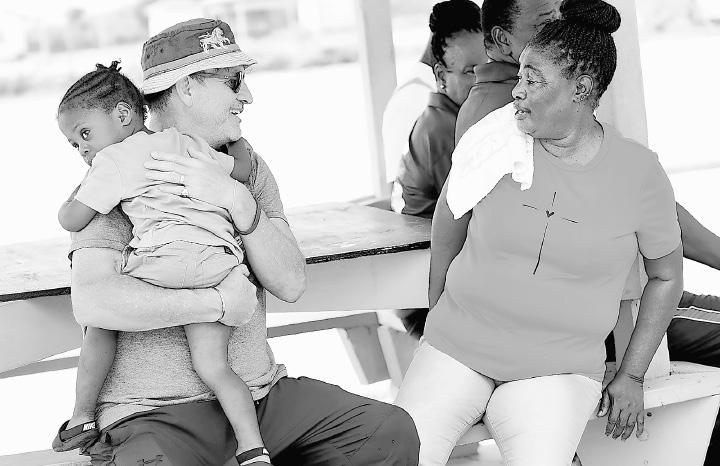
— that’s why planes can’t land here!” he said.
Ms Ferguson added that a longer runway would allow for faster medical evacuations and emergency responses. “The airport really needs to be sorted out on this island. That would help with the air ambulance and all of that,” she said.
prison on February 16, 2024, accused in the killing of 39-year-old Rudiska Bethel in a drive-by shooting on Ragged Island Street. At the time of the shooting, Culmer was also on bail for attempted murder.
Senior Magistrate Shaka Serville charged him, 34, with murder and two counts of attempted murder.
Culmer, with accomplices, allegedly shot and killed Ms Bethel as she stood outside a bar on Ragged Island Street around 7pm on January 31. He also allegedly injured 40-year-old Carla Bain and 36-year-old Lorenzo Sands while they were talking with the victim.
Both Ms Bain and Mr Sands were treated successfully in hospital for gunshot injuries to their right leg and right forearm, while Ms Bethel died at the scene.
In a similar case in September 2022, a 25-year-old man escaped from custody after being sentenced to prison. London Rahming led police on a two-day hunt after the man fled from the Magistrates’ Court on Friday. He had been sentenced to 15 months behind bars for violating the conditions of his bail.
Ms McKinney said improving the airport would also boost tourism, which continues to suffer from travel delays and lost luggage. “They don’t consider us enough. You know, we have hundreds of tourists that come through here every year, and it’s a shame to see that,” she said. She recalled a recent visitor who flew in for a week of fishing but received his luggage only on the day he departed. Residents said they feel forgotten by the government, lacking even basic services such as customs and immigration officers to process visiting yachts and flights.
Despite the hardships, Ms Ferguson said clinic staff continue to do their best to care for the community. But, she added, a more stable fuel supply and investment in infrastructure would make our jobs easier and improve healthcare for residents.
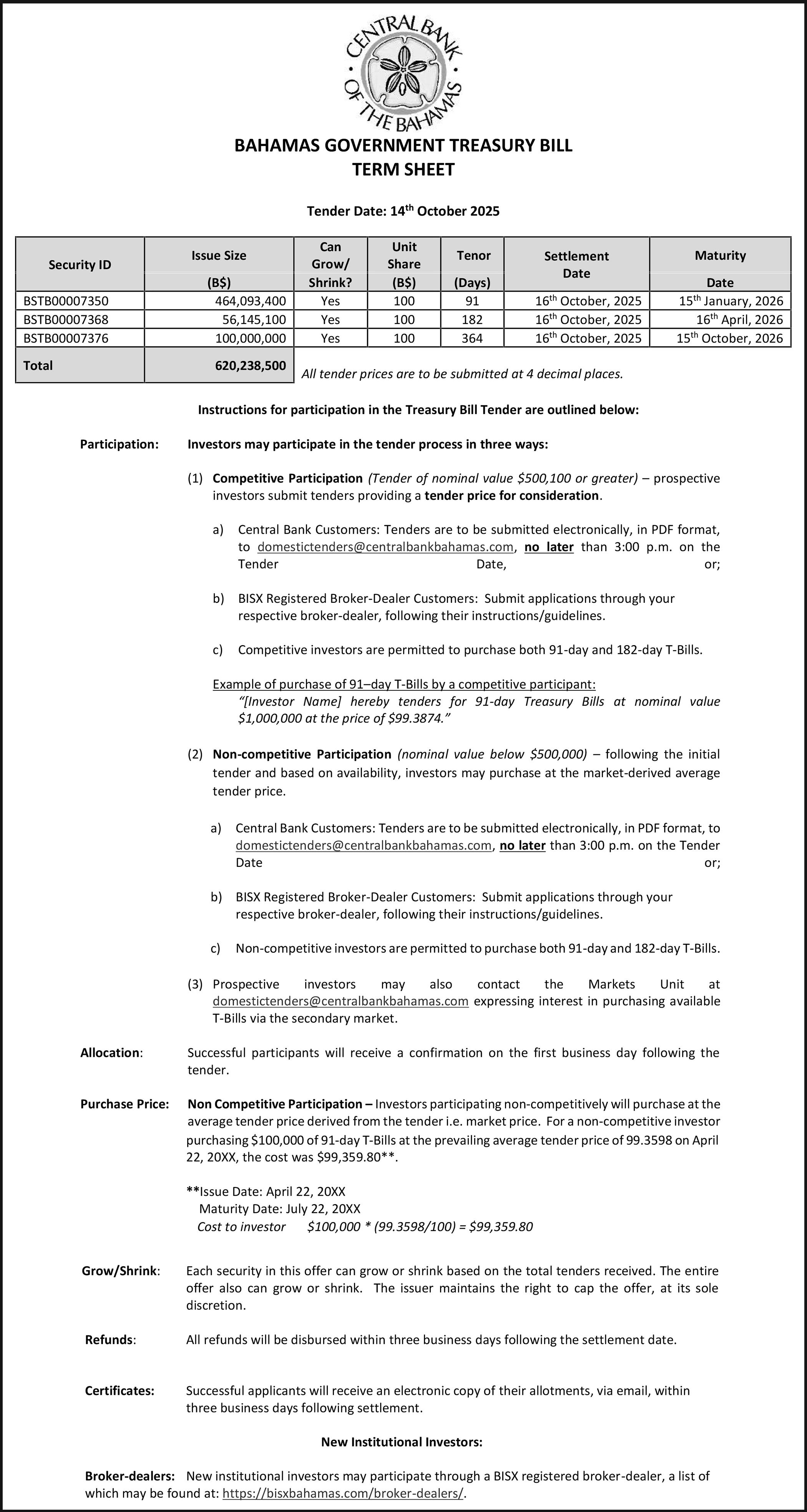
MONDAY, OCTOBER 6, 2025

By MALCOLM STRACHAN
WHEN I sat down to write last week, news had only just come through about the passing of Vaughn Miller. People were in shock, and in mourning. Since then, copious tributes have been paid to the Minister of Environment and Natural Resources – and of course questions have turned to what comes next.
A vacancy in the House of Assembly must be filled, that is the law, but with the prospect of a general election not too far distant, FNM leader Michael Pintard chanced a gambit to encourage Prime Minister Philip “Brave” Davis to skip a by-election and go straight to a general election.
Back in June, the FNM seemed to be operating under the belief that a general election was close, and might even have been held in September, the month just passed. That came and went, but it was a strong feeling in the FNM that the PLP would go early, no matter what the likes of PLP chairman Fred Mitchell said, insisting the party would go to a full term, while Deputy Prime Minister Chester Cooper speculated that the FNM seemed “eager for a beatdown”.

At the time, Mr Davis said the date of an election was “here in my heart”.
In electoral terms, there is merit for the PLP in keeping the Opposition guessing over when the election might be.
There are a lot of things that an incumbent government cannot help when it comes to an election – but timing is certainly one of them. Global issues can affect your economy, natural disasters can come at any time, and there are perpetual problems such as crime, immigration and so on that are factors at the polls. But if you’re in office and you know that you have, for example, a pay rise for public servants kicking in at Christmas, you want to make sure you send people to the polls in good spirits rather than still waiting for the money to arrive.
Under the Constitution of The Bahamas, paragraph 67 (3) says that when a seat is vacated for any reason other than a dissolution of Parliament, the Governor General shall issue a writ for the election of a member to fill the vacancy and such election shall be held within 60 days after the occurrence of the vacancy. Mr Davis confirmed to reporters last week that as far as he is concerned the law requires him to hold a by-election within 60 days.
So put to bed the notions of a full general election, it would seem. And
that makes sense. Unless you’re ready to go already, why would you rush to the people’s judgement?
That puts this prospective by-election in an interesting position indeed – will it be a sign of the general election to come? Or will it be the election of a lame duck, who will only be in the post for likely a few months before they have to run again?
Back when the vacancy occurred in West End and Bimini after the death of Obie Wilchcombe, former Prime Minister Hubert Ingraham reportedly advised Mr Pintard not to contest the seat. Mr Ingraham back then supposedly said that by-elections favour the PLP, and the party would be better off focusing on the next general election. The party ran anyway, and lost.
The past week has also seen the reappearance of the DNA – remember them? Well, we ought to remember them because there was a run of news last week too suggesting that former Prime Minister Dr Hubert Minnis might end up as the party’s leader, with former DNA leader Branville McCartney as his deputy. McCartney distanced himself from such speculation, but Dr Minnis kept the ball up in the air, declining to deny the rumour when given the chance. Is he really considering it? Or is he just having fun with keeping the FNM on its toes, wondering what he will do?
Running in any election isn’t cheap and there will be questions in each party – PLP, FNM, DNA, the Coalition of Independents, the Bahamas Constitution Party and whoever else shows up – over how much it is worth committing in resources to a seat that any winner will only hold for a brief time.
There is a case to be made for saving those resources and skipping the race until the general election.
But there is also a case for making a statement about what the level of support for your party is to signal to your voters that you are worth a gamble in the full vote. If the PLP has a strong showing in the seat, it might bolster confidence in re-election. Equally, for the FNM, if they win the seat, especially if it is by a big number, it will encourage people to think that a new FNM administration is on the way. Indeed, it might make the PLP rethink when it plans to hold a general election and hold on as long as possible. As for the DNA, what better way to remind people you are here than to run and see what you can get? The COI? I’d be surprised if leader Lincoln Bain missed a chance to make some noise. For the PLP and the FNM, a by-election will be high stakes. They can’t afford to do anything other than go all in. For the others, the stakes are lower, but I’d still expect them to play their hand and see how it goes.
Minnis, at least, unless he reveals some new party plan, is unlikely to be a factor – he is focused on Killarney.
I am sure we will hear soon about the decision on a by-election – and that in turn will doubtless trigger each party to announce its plans.
My bet is they will all be in the race – and the outcome will be very telling indeed. Whoever wins may have a short tenure indeed, but their election could have an impact far beyond the length of their time in post during this Parliament

By VICTORIA SARNE
THERE’S an old saying:”If you want to go fast, go alone; if you want to go far, go together.” And that’s exactly what this story is about - how the dreams and intentions of three unrelated people gradually gathered momentum like a snowball rolling down a hill, causing other likeminded people to join in. This collection of energetic, caring people collectively birthed what is now Lend a Hand Bahamas, the nonprofit on Lewis Street committed to Educational and Empowerment programmes for children and young people at risk in the Bain and Grants Town constituencies.
This is how, three people of different ages, ethnicity and background, each from a different country, but sharing similar visions and a commitment to helping others, found each other through a mutual friend. These three were Shelagh Pritchard, Bahamian, Lucas Metropulos, Greek American and Mitsy Irving, Jamaican. Before Lend a Hand Bahamas (LAHB) became the thriving entity it is now, it’s foundation was built on the shared vision, leadership and values of three people, yet to come together, working independently within their communities. It’s important to recognise the selfless individuals who share their
generous spirits and commitment of time and energy to others by putting in the hard yards day after day, year after year. Shelagh Pritchard was born in Nassau to Philip Farrington, a WWII pilot who returned home to work with British Airways; her mother was a British WWII Navy WREN who worked with Sir Victor Sassoon. Shelagh’s passion for working with the public started at age 18 and embraced more than one career including the Hospitality industry, and assisting charter Blairwood Academy, for children who learned differently. She volunteered with the Bahamas Red Cross, the Women’s Corona Society, Help for Children, the Urban Renewal Centres and others; she was one of 14 charter founding members who started the Lignum Vitae Centre of Hope in 2011. She trained with the University of Florida National 4-H working with children who attended the Urban Renewal Centres, after school hours. She is deservedly the recipient of several awards: the Rotary Sunrise Club Paul Harris award, the Sir Victor Sassoon Heart Foundation award and a British award,The Points of Light Award. Before Lend a Hand Bahamas, Shelagh had started a small satellite, non-profit, 4-H school in an old wooden house on Meeting Street. Mitsy Irving lived upstairs with
her young daughter and was tutoring some of the local children.
Lucas has said his meeting with Shelagh helped him realise that she could be a really powerful partner for LAHB and a genuine change-maker who could help fulfil and ramp up the key programming needed.“Meeting someone who has done so muchoften in the shadows - for The Bahamas, for children, for women, for families, inspired me and made me realise that we could do far more together.”
Shelagh has similar praise for Lucas calling him “ a powerhouse”.
Mitsyann Irving’s dedication to educating and mentoring children began in Jamaica where she was born in a garrison/inner city to a single mother, a teacher, the sole provider. Experiencing that struggle first-hand made her determined to achieve something better for herself and her family. She applied herself to gender and development studies, teaching in early childhood and junior high school for 12 years before moving to Nassau. She has gained certification in non-profit executive management from the Lilly School of Philanthropy, Indiana University.
Her first years here started out with tutoring children under a tree on a property owned by Scrooge (Valentino Brown) on Lewis Street followed up by assisting

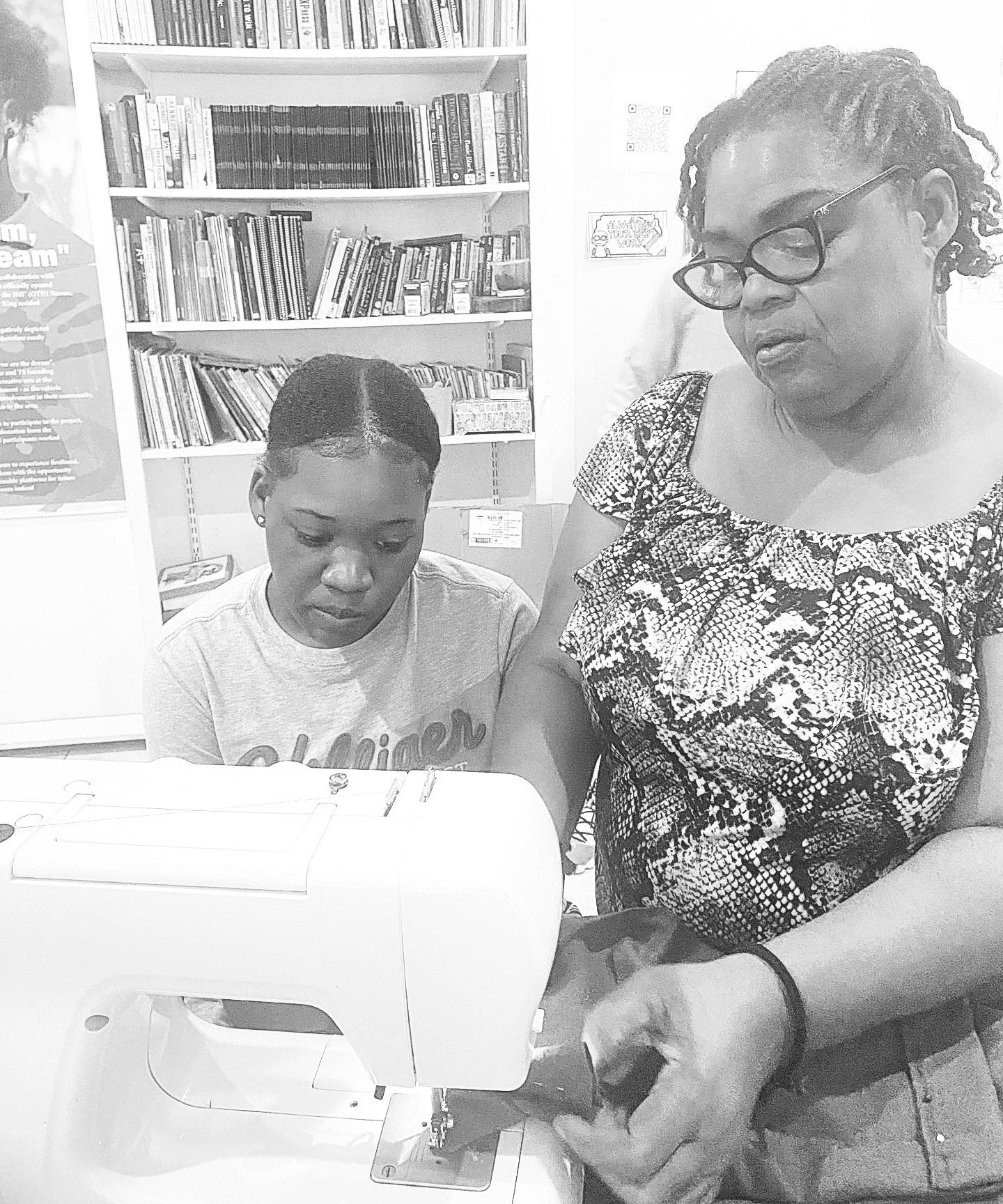
him with his summer camp. During this time, she met Shelagh, working with her at Lignum Vitae, volunteering with Lend a Hand Bahamas when it began. Lend a Hand grew organically, faster than anticipated because of the overwhelming need and, eventually, with her now considerable experience, Mitsy was appointed executive director in 2021. Lucas Metropulos came to Nassau as a 14-year-old boy to play basketball at the invitation of George Maillis. The court they played on was just behind Hay Street and Lucas made a promise then that one day he would come back and start an NPO for the children in the area. As an undergrad at Duke University in 2012, he pitched a project for funding from DukeEngage. This was an initiative he developed to take a Marine Science Education programme to Ranfurly Homes for Children as a summer camp
experience. Through Mrs Alexander Maillis Lynch’s involvement with Ranfurly, he was introduced to Valentino Brown (Scrooge) on Lewis Street. Lucas couldn’t stop thinking about the children and the obvious need for help.
A year later, he was back on Lewis Street, asking about the possibility of starting a Community Centre. Scrooge introduced him to Edmund Dorsett whose family owned property there; he too wanted to provide something for the community.
With the combined efforts of Lucas, George Maillis and others they raised the first few hundred thousand dollars to start; then the Hellenic Ball, hosted by the Greek Church, became the first major donor. Lucas has a service-oriented family: his father is a Greek Orthodox priest, his late mother was a nurse, each with a commitment to
community service. Lucas was a financial aid student (scholarship), attending St Andrew’s School in Boca Raton and says that experience of being helped made him want to pay it forward. At Duke University, he pursued public policy studies specialising in non profits. He graduated with an MBA in social entrepreneurship. He now has a consultancy helping roughly 200 non-profits around the US, South America and the Caribbean to improve their fundraising capabilities and has raised over $200. Shelagh and Mitsy joined Lucas at Lend a Hand Bahamas in the summer of 2018 with a camp for 45 at the East Street gospel chapel (the 2025 Summer Camp was much bigger as 700 children took part). And the rest “is history”.
Sarne’s podcast follow this link: bit.ly/3KBfF9a

By GARY CHRISTIE Valley Boy member since 1962
THERE is no doubt about it. Winston “Gus” Cooper is the indisputable “King of The Valley Boys Junkanoo Group”, in life and in death. There is no Valley Boy from the Gus Cooper era who does not recognise and value the immense contributions and sacrifices of Gus Cooper and that of his family to the perennial success of our beloved group in the annual Junkanoo festival.
But let’s be clear. There are other families who made stellar contributions to build The Valley Boys into the powerhouse Junkanoo group it is today.
Doyle Burrows has been a work horse for our esteemed group since 1958. A search of the archives of the local print media will show pictures of Perry Christie with his lifelong friends Gus and Doyle in full costume splendour as Scottish Highlanders in 1960, when The Valley Boys achieved their first Junkanoo win. The recently deceased Eddie Ford and the ageless and indefatigable Ed McPhee, have been active Valley Boy faces for countless years and were both staunch Gus Cooper loyalists.
Second generation Valley Boys like Stephen “Eggie Boom” Bain grew up dancing with Gus’s and Doyle sons in our group and evolved into a key costume designer/builder. His mother, affectionately called “Big Vese,” danced on the side of the group from Bay to Shirley Street.
In brief, my point is that there are many persons and families who feel that they also have a legitimate stake in the Valley Boys group they love and have contributed much to. That cannot be ignored.
It is unfortunate that The Valley Boys are involved in a protracted and at times bitter battle with each other. One newspaper article suggested that it was about “group management”. In my view, it is more broad than that.
Our Valley Boys inevitably reached the cross roads on “what should be the philosophical direction of the group in its choice of leaders”?
There are two opposing sides. One seems to favour “Delegated Selection”. In Exodus 18:21, Moses father-in law Jethro, told him , “You da big Man, the chosen one. Select capable
Like political parties, labour unions, religious bodies and other key Bahamian institutions, leaders should be chosen by a democratic vote in properly organised and supervised elections.
men from amongst the people to work with you.”
The other side takes the view that they and the group they love operate in a 21st century Bahamas and leadership is not selected but earned.
Like political parties, labour unions, religious bodies and other key Bahamian institutions, leaders should be chosen by a democratic vote in properly organised and supervised elections.
Folks, that’s the beef, nothing more, nothing less.
The differences in view should not have resulted in a hostile environment with family members and old friends on opposite sides of The Valley Boys Junkanoo Group.
Thomas Moore, an 18th century Irish poet, could not have said it any better, “Alas, how light a cause may move dissension between hearts that love”.
Yes! There have been efforts to bridge the gap between the two philosophical sides. A lifelong Valley Boy who has been a historical fixer for the group anytime there were troublesome organisational issues, made a sincere effort at unification. He was disappointed that his efforts were impolitely rebuffed. Bahamians believe in prayer to solve problems. Therefore, I made an approach to the group’s de facto spiritual advisor, a respected and active theologian who like all of us, loves his Valley Boys.
In Old Testament times, spiritual leaders were metaphorically described as shepherds. Shepherds developed a deep, lifelong bond with their sheep and their mission was to lead them to the best pasture.
I felt there was no one better to guide The Valley Boys flock out of the quagmire of confusion it finds itself in.
Frankly, my hope was that our shepherd would have been able to corral us all in one big room and similar to voting in a new Pope, admonish us to come out
with our choice of leaders.
Perhaps, the timing was not right, as our spiritual advisor was dealing with more pressing issues.
It remains on my bucket list to enhance the “one group” winning legacy of “King Gus” by cajoling The Valley Boys to achieve the blessing of Psalm 133:1, “Behold how good and pleasant it is when brothers dwell in unity”.
I also want to take this opportunity to opine that the Bahamas Government’s thrust for a more active role via The National Junkanoo Committee (NJC) in Junkanoo culture is a positive development for Junkanoo groups and the artisans who expend significant personal funds and time on production of costumes.
I am close to a young man in The Valley Boys who produces exceptional lead costumes at substantially his own cost. On one hand, he is desirous of attracting marketing clout to sell his costume in or out of the country as a major tourism exhibit and on the other hand he is screaming as a Junkanoo Corporation Of New Providence (JCNP) sympathiser for government to stay the hell out of Junkanoo. I told him point blank, that telling the government to stay out of culture is like telling them to stay out of sports.
You need an entity like government, that wields a big stick to expand the economic benefits of Junkanoo. The Bahamas carnival groups can attest to that.
Once government’s interest in and support for carnival declined, so did the festival.
I do not know what the specific concerns or expectations of the JCNP are with the new proposed administrative structure for promotion and management of Junkanoo. I fully support that Junkanoo groups via their leaders should “have a voice” in the structure and deliberations of the NJC, but it is regrettable that they appear to have chosen


a confrontational stance with government on “who gat the biggest Junkanoo muscle?”.
The NJC must review the rules regime of the JCNP. A lot of unnecessary energy and goodwill has been spent by the JCNP on insisting on flawed protocol to parade as an A group.
Junkanoo is an expensive exercise and to rush as an A group with a credible showing can cost six figures. It is
a punitive policy to request any potential A group to first parade as an exhibition group. Colours and Fancy Dancers are accomplished B groups who arguably may be better than some A groups. What happens if they wanted to step up to the A category and met all of the technical criteria on group and costume size?
It is an illogical and unfair rule and as the JCNP is
comprised of Junkanoo group leaders, one can reasonably accuse them of operating as a Junkanoo Cartel with the intent of discouraging rather than encouraging competition with anti-competitive stipulations. I hope that the new administrative structure for Junkanoo will strive to promote fair competition. Now, let’s all get ready to rush in peace.


THE Dominican Republic (DR) is hosting the 2025 Summit of the Americas – a gathering of the Heads of State and Government of 32 countries of the Western Hemisphere.
On September 30, the Government of the DR, publicly stated that Cuba, Nicaragua, and Venezuela will not be invited to the 2025 Summit of the Americas. The Government was careful to explain that its choice is necessary to “ensure the widest possible political dialogue” and to “guarantee the success of the Summit”. It also makes clear that this decision “does not interfere with bilateral relations” with any of the three countries.
This decision is likely to provoke a response similar to that seen at the 2022 Summit in Los Angeles, when the US administration of Joe Biden did not invite the same three governments. Calls for Heads of Government to stay away followed, and a few did so in protest at the non-invitation of Cuba’s President Miguel Díaz-Canel Bermúdez, Nicaragua’s President Daniel Ortega Saavedra, and Venezuela’s President Nicolás Maduro Moros. Leaders should think hard before staying away from the 2025 Summit. Global and regional conditions have shifted: wars in the Middle East and
By SIR RONALD SANDERS
Europe cast economic and security shadows across the Americas; within the hemisphere, ideological rifts are reopening. This is precisely the moment for leaders to meet— to manage differences, protect interests, and act in the interest of all the peoples of the Americas. Attendance is leverage, not endorsement. Leaders who believe that Cuba, Nicaragua, and Venezuela should be invited should say so at the Summit, in direct terms. Refusing to attend neither alters the guest list nor delivers gains for the peoples of the Americas; it only removes strong national voices from the room where decisions and deals are made.
The agenda in Punta Cana in the DR is built around four urgent security pillars: citizen security, energy security, water security, and food security. Across reputable global assessments, Latin America and the Caribbean ranks poorly on all four: the region bears the world’s highest homicide

burden; most countries are not water-secure; energytransition progress and grid reliability lag behind other regions; and the cost of a healthy diet is the highest in the world, alongside elevated food-insecurity rates. They determine whether freedom of speech is preserved; whether hospitals, schools and hotels have electricity; whether water pipes run and crops survive; whether households have access to food at prices they can afford.
The DR government put out the suggested theme for the Summit with these four pillars since February and the first draft of a possible Declaration from the Summit was issued in June. Since September 11, government representatives of the 32 countries have been negotiating the outcome document.
A major initiative at this Summit is the CEO Convocation co-hosted with the Inter-American Development Bank. That platform is designed for public authorities and private capital to
assemble the financing and execution capacity that the four pillars require. Public–private partnerships, built transparently and on fair terms, can shorten delivery timelines and spread costs sensibly. The CEO meeting is where those partnerships can be made real.
Another imperative is greater trade and economic integration across Latin America and the Caribbean. Integration scales markets, deepens and derisks supply chains, and accelerates the spread of knowledge and expertise. Practical steps such as, customs facilitation, reliable sea- and air-links, and competitively priced access to infrastructure inputs, are all matters leaders should use the Summit to agree and advance.
Apart from these general considerations, Caribbean leaders should be at the Summit to focus on particular Caribbean concerns. The recent UN Security Council decision on Haiti must be advanced with practical timelines, resources, and roles. Understanding and progress are also needed on differences over climate change and sustainable development, where positions diverge but impacts converge. The negotiations in the Summit Implementation Review Group (SIRG), made up of all the independent states of
the Americas except Cuba, Nicaragua, and Venezuela, began on September 11 and have yet to resolve differences on these points at the technical level. It may take direct consultation by leaders to agree on actions that can be taken.
The last Summit, despite political controversy, still produced outcomes of value, including climate- and energy-cooperation channels that mobilized technical support and investment for Caribbean states. The lesson is straightforward: even when politics creates dissonance, useful progress is possible when leaders are present, prepared, and focused.
There is a wider principle that should be stated; movement toward greater democracy and respect for human, civil, and political rights is necessary for broad-based development and for international financial support. In Cuba, Nicaragua, and Venezuela, tangible steps in that direction would encourage broader backing across the hemisphere. In Venezuela’s case specifically, military threats against Guyana should give way to a peaceful, lawful path under international law and the process of the International Court of Justice that the UN SecretaryGeneral authorized and CARICOM governments
have endorsed. It is understood that President Trump may not attend for security reasons – a concern that might yet be resolved. Nonetheless, senior US representation is expected; at minimum Secretary of State Marco Rubio or Vice President Vance, or both. The margins of the Summit are well-suited to quiet, candid exchanges with US principals on the effects of US policy across the hemisphere; conversations that can yield practical attention to pressing issues.
This is a meeting to be present, active, and speaking: the DR government has set a constructive path; its non-invitations to Cuba, Nicaragua and Venezuela are framed as a Summitspecific decision, without prejudice to bilateral relations. Leaders should use that path to pursue national interests and advance hemispheric cooperation. Not attending leaves influence at the table in other hands. Attending, and doing the work, serves the people of the Americas.
The author is the Ambassador of Antigua and Barbuda to the United States and the OAS, and Dean of the OAS Ambassadors accredited to the OAS. Responses and previous commentaries: www.sirronaldsanders.com

By JADE RUSSELL Tribune Staff Reporter jrussell@tribunemedia.net
PANIC swept through the Harbour Green Shopping Plaza on Thursday when a fire at Café Coco triggered an explosion that sent shockwaves through nearby stores, leaving staff fearing a plane had crashed into their building.
Tara Morley, owner of Cole’s of Nassau, Love Brand & Co, and Morley for Men, said she and her employees were preparing for a year-end sale when the blast rattled their store.
“I felt debris fall from the ceiling. The chandelier was swinging,” Ms Morley told The Tribune on Friday, seated inside Cloe’s across from her two damaged stores. “I thought a beam had cracked and the roof was going to collapse on us. At one point, one of my other team members thought a truck had crashed into the building. Another one of my team members thought a plane had crashed. We were all trying to figure it out.”
Police said the fire was reported shortly after 2pm in the Western Road area.
Officers arrived to find a single-storey building engulfed in flames coming from the roof. According
to the initial report, a local gas company was servicing a gas tank at the restaurant when an explosion occurred.
Two employees of the company, aged 32 and 30, were injured and taken to hospital by Emergency Medical Services. The fire was extinguished, but the northern side of the roof was destroyed.
Chief Fire Officer Demris Ambrister said Café Coco was destroyed inside, while the adjoining Love Brand & Co and Morley for Men stores suffered roof damage.
Ms Morley said after hearing the explosion, she and her staff ran outside and saw the flames spreading. She rushed between her businesses to ensure everyone was safe, as the gas truck remained nearby and officials ordered the area cleared.
Despite the destruction, she said she was grateful her team escaped unharmed.
“We’re all just very lucky,” she said. “As far as our team is concerned, we’re very blessed. The situation could have been a lot worse. Hopefully, there will be additional precautionary measures with gas companies and places who receive gas going forward, to try and avoid this type of
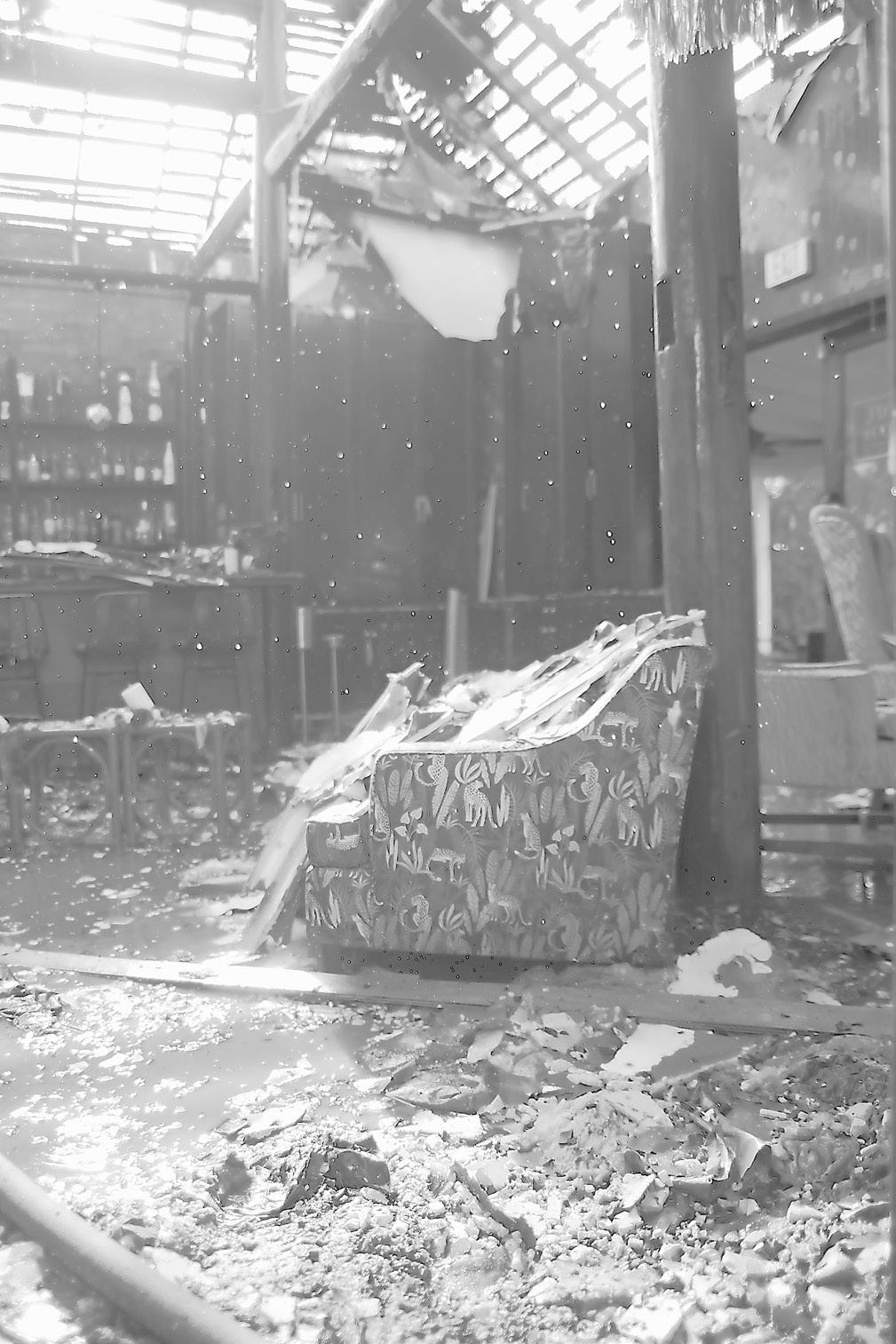
after a
in the future.”
Ms Morley said her stores are insured and commended the landlord for acting swiftly to begin roof repairs. The owner of Café Coco declined to comment.
A POLICE officer has been charged in connection with allegations of indecent assault. According to police, the constable, who they did not name, was arraigned before the Magistrate’s Court on Thursday, October 2, 2025, on two counts of indecent assault. He pleaded not guilty to the charges and was granted $7,500 bail with two sureties.
The charges stem from a complaint made to police on Sunday, September 28. Police said an internal investigation is ongoing.
By LEANDRA ROLLE Tribune Chief Reporter
lrolle@tribunemedia.net
A 25-YEAR-OLD man was granted bail on Friday after police allegedly found him with a loaded firearm in Eleuthera last week. Prosecutors said Jervito Johnson was caught in Gregory Town with a CPX 29mm pistol and three live rounds on October 1.
Johnson pleaded not guilty to the offences during his arraignment before Chief Magistrate Roberto Reckley. Inspector Deon Barr, who prosecuted the case, did not oppose bail but asked for strict conditions. However, Alphonso Lewis, the defendant’s attorney, opposed Johnson being outfitted with an electronic monitoring
device, arguing his client was employed, had a young child, and posed no flight risk. Still, Magistrate Reckley rejected the request, citing the seriousness of the charge.
He subsequently granted Johnson $7,500 bail with one or two sureties.
The defendant was also ordered to wear an electronic monitoring device


By DENISE MAYCOCK Tribune Freeport Reporter dmaycock@tribunemedia.net
Prominent Grand Bahama attorney and civic leader Jethlyn Burrows has died, prompting tributes from across the legal and civic communities for a woman remembered as a trailblazer in justice and service.
Mrs Burrows, the managing partner at Musgrove Burrows Law Chambers, was widely respected for her legal expertise and dedication to public service. Her legal practice spanned family law, criminal and civil litigation, real estate, and industrial relations. She also held several senior positions within the judiciary, serving as a judge of the Bahamas Industrial Tribunal, a magistrate, judicial officer, and deputy registrar of the Supreme Court.
and sign in at his nearest police station weekly.
The case was adjourned to next month for mention.
Beyond her professional contributions, Mrs Burrows was an active figure in civic life. She was a
former president of both the International Federation of Women Lawyers (FIDA) and the Pilot Club of Lucaya, and a member of the Caribbean Women in Leadership (CIWiL) Bahamas Chapter.
The CIWiL Bahamas Chapter described her as “a woman of grace, purpose, and steadfast commitment to community service.”
“She was our Sister and friend and she will be sorely missed. We stand with you in honoring her legacy and celebrating a life well lived,” said CIWiL Chair Robyn Lynes.
Colleagues and community members praised her passion for education, faith, and youth empowerment — values they say she championed throughout her life and career. Her influence extended beyond Grand Bahama, leaving what many described as a lasting legacy throughout The Bahamas.
Mrs Burrows is survived by her sons, extended family, and loved ones.

Associated Press
PRESIDENT D onald
Trump is sending California N ational Guard members to Oregon after a judge temporarily blocked his administration from deploying that state’s guard to Portland, and the D emocratic governors of both states pledged S unday to fight the move in court.
A Pentagon spokesperson said in a statement that about 200 federalized members of the California N ational Guard who had been on duty around Los Angeles were being reassigned to Portland.
Oregon Gov. Tina Kotek said about 100 arrived S aturday and around 100 more were en route S unday.
Kotek said there had been no formal communication with the federal government about the deployment. California Gov. Gavin N ewsom’s office said about 300 previously federalized California guard members could eventually be deployed.
T he events in Oregon come a day after I llinois’ governor made a similar announcement about troops in his state being activated.
Kotek said the latest move by federal officials is an attempt to circumvent S aturday’s court ruling that blocked deployment of Oregon’s guard members.
T he facts on the ground in Oregon haven’t changed,” Kotek said during a news conference S unday. “ T here’s no need for military intervention in Oregon. T here’s no insurrection in Portland, there’s no threat to national security.”
Oregon Attorney General D an R ayfield the state would go back to court on Monday, along with California, seeking to block the latest deployment.
“What was unlawful yesterday is unlawful
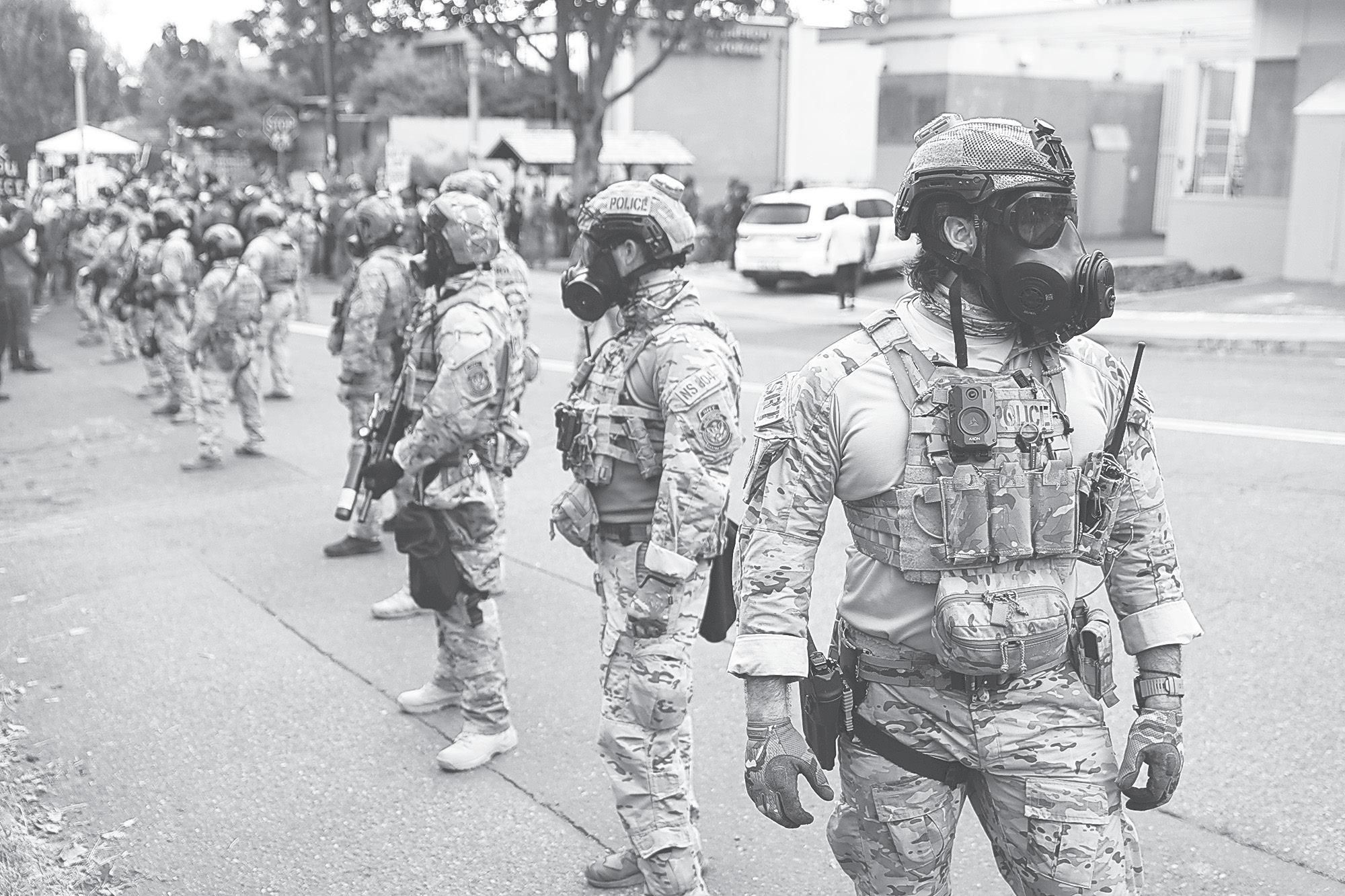
today,” R ayfield said. “ T he judge’s order was not some minor procedural point for the president to work around, like my 14-year-old does when he doesn’t like my answers.”
R ayfield added that Oregon “will absolutely not be a party to the president’s attempt to normalize the use of the United S tates military in our American cities.” N ewsom, a D emocrat, said in a statement that California personnel were on their way S unday and called the deployment “a breathtaking abuse of the law and power.” He said these troops were “federalized” and put under the president’s control months
ago over his objections, in response to unrest in Los Angeles.
“ T he commander-inchief is using the U S military as a political weapon against American citizens,” N ewsom said.
“We will take this fight to court, but the public cannot stay silent in the face of such reckless and authoritarian conduct by the president of the United S tates.”
T he U S I mmigration and Customs E nforcement building in Portland has recently been the site of nightly protests.
A Trump-appointed federal judge in Oregon on S aturday temporarily blocked the Trump administration’s plan
to deploy the Oregon N ational Guard in Portland to protect federal property amid protests after Trump called the city “war-ravaged.”
Oregon officials and Portland residents alike said that description was ludicrous. T he protest was relatively small and localized to just one block of the city of 650,000 residents, Kotek said.
U S D istrict Judge Karin I mmergut, a Trump appointee during his first term, issued the order pending further arguments in a lawsuit brought by the state and city. S he said the relatively small protests did not justify the use of federalized forces and
allowing the deployment could harm Oregon’s state sovereignty.
Portland Mayor Keith Wilson said S unday that he saw federal agents engaged in what he described as unjustified use of force and indiscriminately spraying pepper spray and impact munitions during a protest outside the I C E facility.
T his is an aggressive approach trying to inflame the situation that has otherwise been peaceful,” Wilson said.
Portland has alerted the civil rights division of the D epartment of Justice to the agents’ actions, Wilson said.
Trump has characterized both Portland and
Chicago as cities rife with crime and unrest. S ince the start of his second term, he has sent or talked about sending troops to 10 cities. Trump authorized the deployment of 300 I llinois N ational Guard troops to protect federal officers and assets in Chicago on S aturday.
I llinois Gov. JB Pritzker’s office said the situation in Chicago “does not require the use of the military and, as a result, the Governor opposes the deployment of the national guard under any status.” Pritzker didn’t receive any calls from federal officials about the deployment, his office said.
CAIRO Associated Press
ISRAEL and Hamas prepared for indirect negotiations in Egypt on Monday, as hopes for a possible ceasefire in Gaza grew after Prime Minister Benjamin Netanyahu said a hostage release could be announced this week.
Tuesday marks two years since the Hamas attack that sparked the war.
President Donald Trump has welcomed the Hamas statement accepting some elements of the US peace plan. Israel has said it supported the new US effort. Under the plan, Hamas would release the remaining 48 hostages — about 20 believed to be alive — within three days. It would give up power and disarm.
The delegation led by top Israeli negotiator Ron Dermer will leave Monday for the talks in Sharm el-Sheikh, Netanyahu’s office said. An Egyptian official said the Hamas delegation had arrived. The official, speaking on condition of anonymity because he wasn’t authorized to brief reporters, said US envoy Steve Witkoff is joining the talks.
Discussions will focus on the proposed exchange of hostages for Palestinian prisoners held by Israel, Egypt’s foreign ministry said.
US Secretary of State Marco Rubio called the situation “the closest we’ve come to getting all of the hostages released.”
Speaking on ABC’s “This Week,’’ he described two phases after Hamas accepts Trump’s framework: The hostages are released and Israel pulls back in Gaza to the “yellow line,” where it was in August. Rubio told CBS that

Hamas should release hostages as they are ready, and that bombardment needs to end so they can be released. The US plan also addresses Gaza’s future. In a text exchange with CNN’s Jake Tapper, Trump said there would be “complete obliteration” if Hamas stayed in power there. Trump also texted that Netanyahu was on board for ending the bombing and peace in Gaza but added, “soon on the rest.”
Support for a ceasefre grows
Israeli government spokeswoman Shosh Badrosian told journalists that Netanyahu is in “regular contact” with Trump and that the prime
minister has stressed that the talks in Egypt “will be confined to a few days maximum.”
“I hope that we are closest to a hostage deal since the (ceasefire) deal in January,” Israeli Foreign Minister Gideon Sa’ar said in a speech.
Anxious relatives of hostages gathered near Netanyahu’s residence in Jerusalem, with some urging Trump to continue to apply pressure. Israel’s recent military offensive in Gaza City led many to fear for the hostages’ lives.
“We cannot allow such a historic agreement to be sacrificed again,” said Michel Ilouz, father of Guy Ilouz. As hundreds of
thousands of people marched across several European cities and elsewhere in support of Palestinians, the foreign ministers of eight Muslimmajority countries issued a joint statement welcoming steps toward a possible ceasefire.
They also underlined their commitment to the return of the Palestinian Authority to Gaza, unifying Gaza and the West Bank and reaching an agreement leading to a “full Israeli withdrawal” from Gaza.
Rubio told ABC that decisions regarding a governing structure or international group to manage Gaza can take place simultaneously with
the ceasefire’s first step. That’s the part that I think is going to be a little tougher to work through, but that’s what’s going to provide permanency to the end of the conflict,” he said.
At least 12 killed in Gaza on Sunday
Trump has ordered Israel to stop bombing Gaza, but residents and local hospitals said strikes continued across the territory.
The Israeli government spokeswoman, Badrosian, said “certain bombings have actually stopped inside of the Gaza Strip.”
But Israel’s military chief of staff, Lt. Gen. Eyal Zamir, said that “if the
political effort does not succeed, we will return to fight.”
At least eight people were killed Sunday in multiple strikes in Gaza City, according to Shifa Hospital, which received the casualties. A security official who spoke on condition of anonymity because they were not authorized to talk to the media said the strikes were against Hamas militants who were a threat to troops.
Four other people were shot dead near an aid distribution site in the southern city of Rafah, according to Nasser Hospital. Israel’s military said it was not involved.
Doctors Without Borders confirmed the death of colleague Abed El Hameed Qaradaya, who was wounded in an attack Thursday that killed another colleague in Gaza.
Gaza’s Health Ministry said the Palestinian death toll in the war reached 67,139 on Sunday, with nearly 170,000 injured. The ministry does not differentiate how many of those killed were civilians or combatants, but says women and children make up about half of the dead. The ministry is part of the Hamas-run government, and the UN and many independent experts consider its figures to be the most reliable estimate of wartime casualties.
Israel’s military has said it continues to dismantle Hamas infrastructure and warned residents not to return to northern Gaza.
“We’re on the brink, and we don’t know whether one will die of a strike or starvation,” said Mahmoud Hashem, a Palestinian father sheltering in a tent in Gaza City.